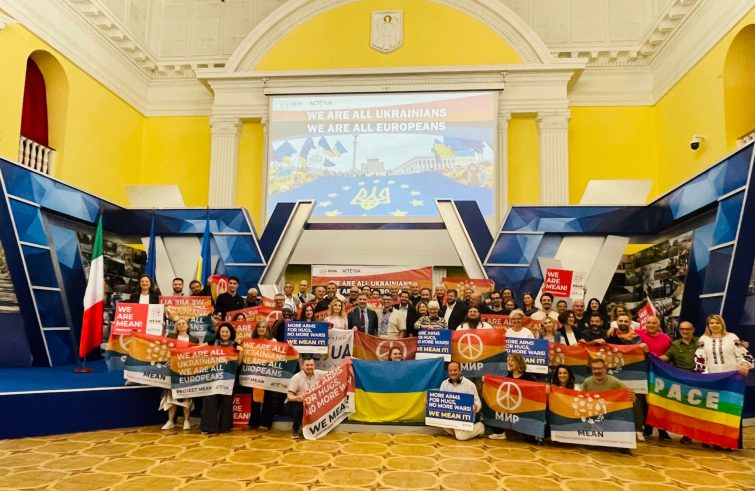
It was an historic and memorable moment. The first group of peace activists arrived in Kyiv a few days ago calling for an end to armed strife, personally expressing solidarity with the Ukrainian people. This historical event was experienced not without some apprehension, with the peace activists marching through the streets downtown Kyiv. All around them was a war-torn city, shattered by tensions and warfare. In the town hall they then met with the mayor of Kyiv and the Apostolic Nuncio. They equally made a point of meeting the local population and Ukrainian civil society. Their attention focused on their sufferings and their needs, caused by over four months of war.
A Russian missile that hit Kyiv a few days before their arrival destroyed a residential building and a kindergarten. The attack was a reminder that no place in Ukraine can be said to be safe. Against this backdrop, some sixty peace activists from Italy, representing thirty-five associations, left Krakow heading, in peace, to Kyiv. A symbolic yet unprecedented march.
The context was not propitious. Martial law, passed soon after the outbreak of the Russian invasion, bans and prohibits all public rallies in Ukraine. The meeting, which took place in a hall made available by Kyiv City Council, was opened by the mayor of the capital, who warmly welcomed the Italian peace activists and expressed his gratitude to them. It was a very meaningful event, by no means a given, as the term Peace in Ukraine is often met with tensions. In fact, it is often equated with an unconditional surrender of Ukraine to Russia. ”We repeatedly attempted to call on Moscow to “try to find a joint solution, even a compromise solution – mayor Vitaliy Klitschko pointed out – but a compromise solution does not mean relinquishing a part of our territory. Should a foreign State occupy Sicily, would you consider surrendering Sicily to the invader a good and fair tradeoff? I assume the answer is no. We are prepared to discuss about everything, but the Russian army must leave Ukraine.”
At the moment, glimmers of peace are hard to find, and the Peace March promoted by the European Movement of Nonviolent Action (MEAN) risked being perceived as somewhat utopian. Yet the Apostolic Nuncio to Ukraine, Msgr. Visvaldas Kulbokas, encouraged the peace activists’ spirit: “If we face a situation whereby Ukraine suffers such heinous aggression and has no other option than to ask other countries for moral, economic and military support,” he said welcoming the movement, “it means that non-violent action has ultimately failed. But failing does not mean renouncing commitment: we must continue reflecting together on ways out of this war, on how to stop it.” It’s a tremendous challenge – remarked the Nuncio in Ukraine – but we must rise to that challenge, we must continue working towards it. I am grateful to the organisers of this event for having taken up this challenge.”
For the organisers of the March, the outcome nonetheless exceeded expectations. In the light of what happened, it should be noted that for the first time since the outbreak of the war, a group of Europeans – Ukrainians and Italians – joined forces to reflect on ways to end the spiral of hatred triggered by the war. “It is indispensable to make Europe stronger, but not in military terms,” said MEAN spokesperson Angelo Moretti, offering a preliminary assessment of the initiative. “Ours is a simple proposal that we are addressing to Europe, in full knowledge of the extent of its engagement, while grappling with the NATO-Russia controversies. Europe’s voice is still too weak. We call for Brussels institutions’ expertise to be spent on negotiations. We are calling for a Europe with an even greater presence through determined and authoritative diplomatic action.”
After the meeting, the caravan of peace activists resumed their march, gathering their belongings, emotions and memories, especially the images of the many sandbags placed in front of the windows for protection, and the checkpoints at key areas of Kyiv. Images of war. The air raid sirens warning the population to prepare for yet another attack, which sounded just before departure, were yet a further reminder. With teary eyes from the stories of suffering we listened to during these past days, we returned to Italy. Our hearts and minds, however, are still there in Kyiv, Ukraine.
(*) correspondent TV2000











